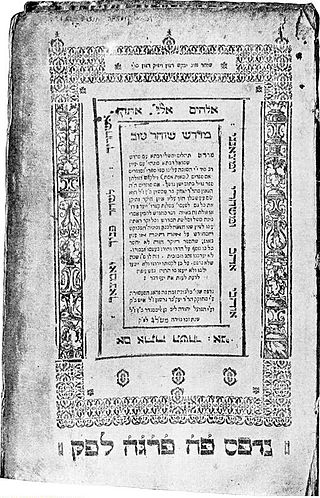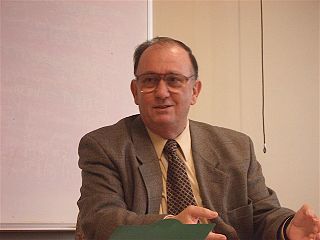Related Research Articles

Habakkuk, or Habacuc, who was active around 612 BCE, was a prophet whose oracles and prayer are recorded in the Book of Habakkuk, the eighth of the collected twelve minor prophets in the Hebrew Bible. He is revered by Jews, Christians, and Muslims.

Judaism is an Abrahamic, monotheistic, and ethnic religion. It comprises the collective spiritual, cultural, and legal traditions of the Jewish people, having originated as an organized religion in the Middle East during the Bronze Age. Contemporary Judaism evolved from Yahwism, the cultic religious movement of ancient Israel and Judah, around the 6th/5th century BCE, and is thus considered to be one of the oldest monotheistic religions. Religious Jews regard Judaism as their means of observing the Mosaic covenant, which was established between God and the Israelites, their ancestors. Along with Samaritanism, to which it is closely related, Judaism is one of the two oldest Abrahamic religions.

Midrash is expansive Jewish Biblical exegesis using a rabbinic mode of interpretation prominent in the Talmud. The word itself means "textual interpretation", "study", or "exegesis", derived from the root verb darash (דָּרַשׁ), which means "resort to, seek, seek with care, enquire, require", forms of which appear frequently in the Hebrew Bible.

The Talmud is the central text of Rabbinic Judaism and the primary source of Jewish religious law (halakha) and Jewish theology. Until the advent of modernity, in nearly all Jewish communities, the Talmud was the centerpiece of Jewish cultural life and was foundational to "all Jewish thought and aspirations", serving also as "the guide for the daily life" of Jews.

Rabbinic literature, in its broadest sense, is the entire spectrum of rabbinic writings throughout Jewish history. However, the term often refers specifically to literature from the Talmudic era, as opposed to medieval and modern rabbinic writings, and thus corresponds with the Hebrew term Sifrut Chazal. This more specific sense of "Rabbinic literature"—referring to the Talmudim, Midrashim, and related writings, but hardly ever to later texts—is how the term is generally intended when used in contemporary academic writing. The terms mefareshim and parshanim (commentaries/commentators) almost always refer to later, post-Talmudic writers of rabbinic glosses on Biblical and Talmudic texts.
According to Jewish tradition, the Torah contains 613 commandments. This tradition is first recorded in the 3rd century CE, when Rabbi Simlai mentioned it in a sermon that is recorded in Talmud Makkot 23b. Other classical sages who hold this view include Rabbi Simeon ben Azzai and Rabbi Eleazar ben Yose the Galilean. It is quoted in Midrash Exodus Rabbah 33:7, Numbers Rabbah 13:15–16; 18:21 and Talmud Yevamot 47b. The 613 commandments include "positive commandments", to perform an act, and "negative commandments", to abstain from an act. The negative commandments number 365, which coincides with the number of days in the solar year, and the positive commandments number 248, a number ascribed to the number of bones and main organs in the human body.

Akiva ben Joseph, also known as Rabbi Akiva, was a leading Jewish scholar and sage, a tanna of the latter part of the first century and the beginning of the second century. Rabbi Akiva was a leading contributor to the Mishnah and to Midrash halakha. He is referred to in the Talmud as Rosh la-Hakhamim -"Chief of the Sages". He was executed by the Romans in the aftermath of the Bar Kokhba revolt.

Exegesis is a critical explanation or interpretation of a text. The term is traditionally applied to the interpretation of Biblical works. In modern usage, exegesis can involve critical interpretations of virtually any text, including not just religious texts but also philosophy, literature, or virtually any other genre of writing. The phrase Biblical exegesis can be used to distinguish studies of the Bible from other critical textual explanations.
Pseudo-Philo is the name commonly used for the unknown, anonymous author of the Biblical Antiquities. This text is also commonly known today under the Latin title Liber Antiquitatum Biblicarum, a title that is not found in the Latin manuscripts. Although probably originally written in Hebrew, it is preserved today only through a Latin translation found in 18 complete and 3 fragmentary manuscripts that date between the eleventh and fifteenth centuries CE. In addition, material paralleling that in the Biblical Antiquities is also found in the Chronicles of Jerahmeel, a 14th-century Hebrew composition. The Latin text of the Biblical Antiquities circulated alongside Latin translations of the authentic writings of Philo of Alexandria. Scholars have long recognized the pseudonymous character of the text now known as the Biblical Antiquities. Primary in this regard is a vastly differing approach to and use of the Jewish scriptures. For the sake of convenience, scholars continue to follow the lead of Leopold Cohn in calling the unknown author "Pseudo-Philo".
According to Rabbinic Judaism, the Oral Torah or Oral Law are statutes and legal interpretations that were not recorded in the Five Books of Moses, the Written Torah, and which are regarded by Orthodox Jews as prescriptive and given at the same time. This holistic Jewish code of conduct encompasses a wide swathe of rituals, worship practices, God–man and interpersonal relationships, from dietary laws to Sabbath and festival observance to marital relations, agricultural practices, and civil claims and damages.

Rabbinic Judaism, also called Rabbinism, Rabbinicism, or Rabbanite Judaism, has been the mainstream form of Judaism since the 6th century CE, after the codification of the Babylonian Talmud. Rabbinic Judaism has its roots in the Pharisaic school of Second Temple Judaism, and is based on the belief that Moses at Mount Sinai received both the Written Torah and the Oral Torah from God. The Oral Torah, transmitted orally, explains the Written Torah. At first, it was forbidden to write down the Oral Torah, but after the destruction of the Second Temple, it was decided to write it down in the form of the Talmud and other rabbinic texts for the sake of preservation.

Aggadah is the non-legalistic exegesis which appears in the classical rabbinic literature of Judaism, particularly the Talmud and Midrash. In general, Aggadah is a compendium of rabbinic texts that incorporates folklore, historical anecdotes, moral exhortations, and practical advice in various spheres, from business to medicine.
This is a list of books by Jacob Neusner. Articles, reviews, etc. are not included here.
"Wissenschaft des Judentums" refers to a nineteenth-century movement premised on the critical investigation of Jewish literature and culture, including rabbinic literature, to analyze the origins of Jewish traditions.
Pardes (פרד"ס) is a Kabbalistic theory of Biblical exegesis first advanced by Moses de León, adapting the popular "fourfold" method of medieval Christianity. The term, sometimes also rendered PaRDeS, means "orchard" when taken literally, but is used in this context as a Hebrew acronym formed from the initials of the following four approaches:

Jane Dammen McAuliffe is an American educator, scholar of Islam and the inaugural director of national and international outreach at the Library of Congress.
Alan Franklin Segal was a scholar of ancient religions, specializing in Judaism's relationship to Christianity. Segal was a distinguished scholar, author, and speaker, self-described as a "believing Jew and twentieth-century humanist." Segal was one of the first modern scholars to write extensively on the influences of Judaism on Paul of Damascus.
Johan Kemper (1670–1716), formerly Moshe ben Aharon Ha-Kohen of Kraków or Moses Aaron, baptized Johann Christian Jacob; was a Polish Sabbatean Jew who converted from Judaism to Lutheran Christianity. His conversion was motivated by his studies in Kabbalah and his disappointment following the failure of a prophecy spread by the Polish Sabbatean prophet Zadok of Grodno, which predicted that Sabbatai Zevi would return in the year 1695/6. It is unclear whether he continued to observe Jewish practices after his conversion.

Michael Edward Stone is a professor emeritus of Armenian Studies and of Comparative Religion at the Hebrew University of Jerusalem. His research deals with Armenian studies and with Jewish literature and thought of the Second Temple period. He is also a published poet.
Eileen Marie Schuller is a professor at the Faculty of Social Sciences at McMaster University in Hamilton, Ontario. Schuller is an official editor of the Dead Sea Scrolls. She teaches undergraduate and graduate studies in the Biblical field. Over a span of 30 years, her involvement in the publication of the Dead Sea Scrolls has led to numerous contributions in authenticating the discoveries found in the caves near the Ancient Qumran settlement.
References
- ↑ Amazon.com: Studies in Exegesis: Christian Critiques of Jewish Law and Rabbinic Responses, 70-300 C.E (Brill Reference Library of Judaism) (Brill Reference Library of Judaism)...
- 1 2 3 "Herb Basser | Religious Studies | Queen's University | Canada". Archived from the original on 2008-07-02. Retrieved 2008-07-22.
- ↑ "Chilton". Archived from the original on 2008-05-17. Retrieved 2008-07-22.